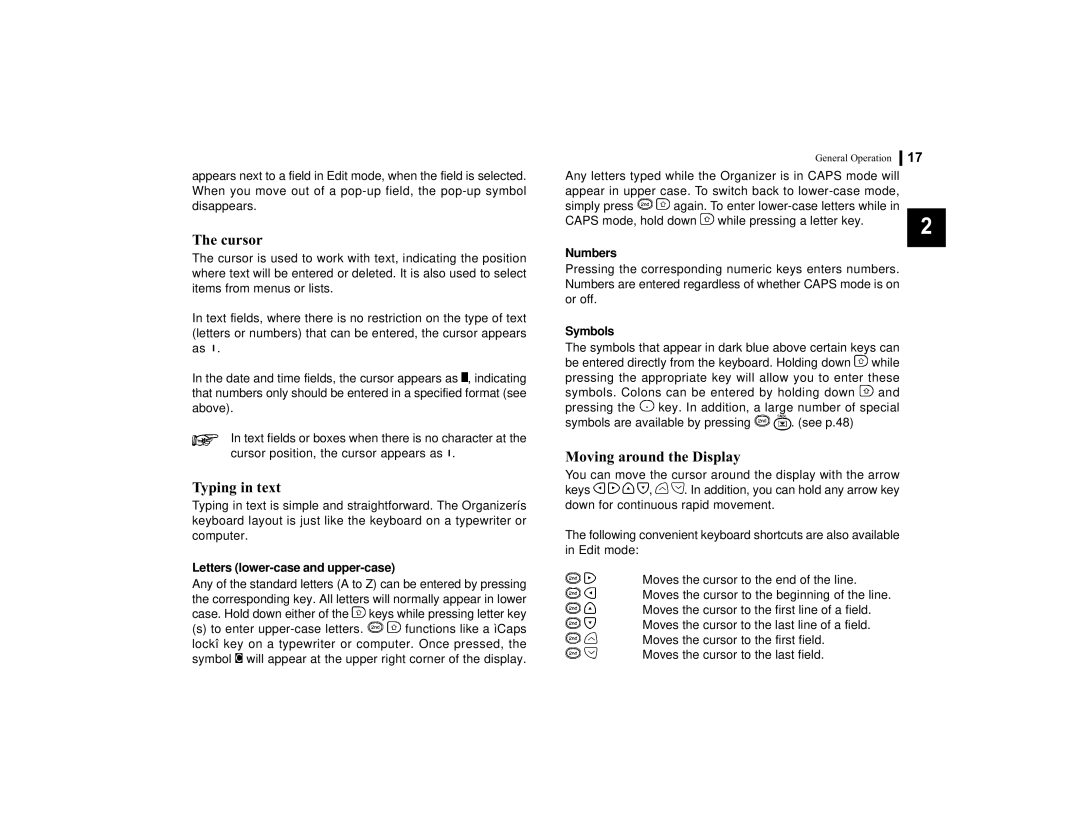
appears next to a field in Edit mode, when the field is selected. When you move out of a
The cursor
The cursor is used to work with text, indicating the position where text will be entered or deleted. It is also used to select items from menus or lists.
In text fields, where there is no restriction on the type of text (letters or numbers) that can be entered, the cursor appears as .
In the date and time fields, the cursor appears as ![]() , indicating that numbers only should be entered in a specified format (see above).
, indicating that numbers only should be entered in a specified format (see above).
In text fields or boxes when there is no character at the cursor position, the cursor appears as .
Typing in text
Typing in text is simple and straightforward. The Organizerís keyboard layout is just like the keyboard on a typewriter or computer.
Letters (lower-case and upper-case)
Any of the standard letters (A to Z) can be entered by pressing the corresponding key. All letters will normally appear in lower case. Hold down either of the ![]() keys while pressing letter key
keys while pressing letter key
(s)to enter ![]()
![]() functions like a ìCaps lockî key on a typewriter or computer. Once pressed, the symbol
functions like a ìCaps lockî key on a typewriter or computer. Once pressed, the symbol ![]() will appear at the upper right corner of the display.
will appear at the upper right corner of the display.
| General Operation | 17 | |
Any letters typed while the Organizer is in CAPS mode will |
|
| |
appear in upper case. To switch back to |
|
| |
simply press | again. To enter |
|
|
|
| ||
CAPS mode, hold down while pressing a letter key. |
| 2 | |
|
|
| |
|
|
|
|
Numbers
Pressing the corresponding numeric keys enters numbers. Numbers are entered regardless of whether CAPS mode is on or off.
Symbols
The symbols that appear in dark blue above certain keys can be entered directly from the keyboard. Holding down ![]() while pressing the appropriate key will allow you to enter these
while pressing the appropriate key will allow you to enter these
symbols. Colons can be entered by holding down ![]() and pressing the
and pressing the ![]() key. In addition, a large number of special
key. In addition, a large number of special
symbols are available by pressing ![]()
![]() . (see p.48)
. (see p.48)
Moving around the Display
You can move the cursor around the display with the arrow
keys ![]()
![]()
![]()
![]() ,
, ![]()
![]() . In addition, you can hold any arrow key down for continuous rapid movement.
. In addition, you can hold any arrow key down for continuous rapid movement.
The following convenient keyboard shortcuts are also available in Edit mode:
Moves the cursor to the end of the line.
Moves the cursor to the beginning of the line.
Moves the cursor to the first line of a field.
Moves the cursor to the last line of a field.
Moves the cursor to the first field.
Moves the cursor to the last field.
